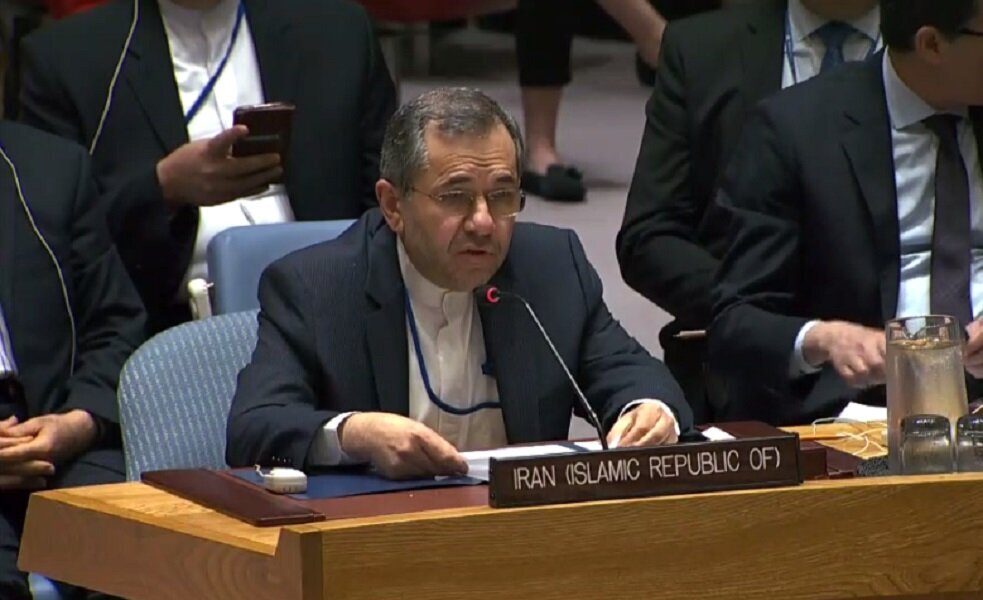Iran backs a balanced enlargement of UN Security Council

TEHRAN – Majid Takht-Ravanchi, Iran’s ambassador to the United Nations, has said Iran strongly rejects the use of UN Security Council as a tool to pursue national political interests and agenda.
“Necessary measures must be taken to ensure that the decisions of a reformed Council will be made not based on national interests of its members but on the common interests of the entire United Nations membership,” Takht-Ravanchi said at the UN General Assembly meeting on Monday, according to IRNA.
“The international community continues to call for the Security Council reform. This call stems from the fact that the Council is not keeping pace with the significant changes of our time, its actions often have not been consistently in conformity with the Charter and it is not truly representative, transparent, accountable and rules-based,” he remarked.
He said in many cases, the Security Council has been inactive and ineffective, and in certain cases, its actions have been ultra vires, and it also has been seriously exploited by certain permanent members.
The Council’s legitimacy and credibility, as well as its serious trust and confidence deficit, is the direct result of this situation, the envoy said, adding that the promotion of multilateralism is a high priority for the overwhelming majority of member states, and a truly reformed Council can greatly contribute to multilateralism.
“Nevertheless, in carrying out this highly sensitive task, all five core issues must be discussed comprehensively within a package and none should be considered less important than others,” he said.
“It is essential to reform the Council’s working methods to ensure its transparency and accountability.”
“This must be done with utmost prudence while taking into account the lessons learned and the realities of our time. For example, if we cannot ensure that the members of a reformed Council are accountable for their action or inaction, we will certainly face the same problems that we want to address now,” Takht-Ravanchi added.
The Iranian envoy also argued in favor of an expanded Security Council, saying an expanded Council will be useful only if the enlargement can transform it into a truly democratic, representative, transparent, efficient, effective and, above all, rules-based and accountable body.
The composition of an expanded Council must also be balanced, both geopolitically and geographically, he said.
“While the Group of Western European and other States is overrepresented in the Council, the other regional groups are poorly represented in terms of number and enjoy fewer rights and privileges in terms of the permanent membership,” the ambassador pointed out.
“To prevent the domination of a certain regional or geopolitical group over the Council, this disproportionality and injustice must be addressed and rectified and providing equal opportunities for all States to become a Council member must also be ensured,” he added.
It is also critical, he continued, to ensure that a reformed Council will be prevented from considering situations that do not constitute a threat to international peace and security, or issues that are related to the internal matters of States, the interference in which is explicitly prohibited by the Charter.
“At the same time, it is essential to reform the Council’s working methods to ensure its transparency and accountability as well as its strict adherence to the Charter. This can prevent the Council from resorting to its Chapter VII functions more frequently and expeditiously,” Takht-Ravanchi stated.
The Iranian ambassador argued that Chapter VII functions including sanctions must be applied only as a measure of last resort, if necessary, and after all means of peaceful settlement of disputes under Chapter VI of the Charter have been exhausted and a thorough consideration undertaken of their short-term and long-term effects, avoiding unintended consequences, in particular for the civilians and for the provision of humanitarian assistance.
“Sanctions are a blunt instrument, the use of which raises fundamental ethical questions as to whether sufferings inflicted on vulnerable groups are legitimate means of exerting pressure on the targeted country,” he maintained.
“In addition, transforming the Council into a truly rule-based and accountable body must remain a top priority. Likewise, the issue of the veto must remain as one of the main elements of deliberations,” Takht-Ravanchi said.
“Furthermore, in deliberations within the IGN, neither delay nor hasty decisions or artificial deadlines should be imposed. At the same time, text-based negotiations at this stage seem to be premature. Likewise, any possible decision on the subject at any stage must be adopted only by consensus,” he concluded.
MH/PA
Leave a Comment